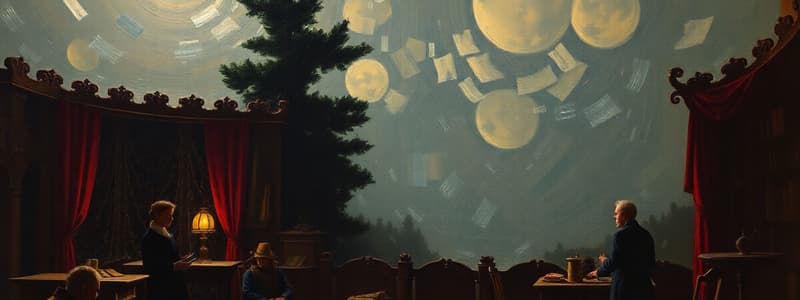Podcast
Questions and Answers
Which term best describes a film or play that has been adapted from a novel?
Which term best describes a film or play that has been adapted from a novel?
- Adaptation (correct)
- Blockbuster
- Screenplay
- Masterpiece
Which of the following is the correct transformation using negative inversion: 'I have never seen such a captivating performance.'?
Which of the following is the correct transformation using negative inversion: 'I have never seen such a captivating performance.'?
- Such a captivating performance I have never seen.
- I have never seen before such a captivating performance.
- Never before have I seen such a captivating performance. (correct)
- Never I have seen such a captivating performance.
Which of the following sentences correctly uses a cleft sentence to emphasize the subject?
Which of the following sentences correctly uses a cleft sentence to emphasize the subject?
- She left her coat, wasn't it?
- What impressed everyone was the acting.
- It was John who directed the play. (correct)
- The costumes are what really impressed me.
In the context of theater, what does 'dress rehearsal' refer to?
In the context of theater, what does 'dress rehearsal' refer to?
Which of the following sentences demonstrates the correct use of emphatic 'did'?
Which of the following sentences demonstrates the correct use of emphatic 'did'?
A film critic wrote, 'The animation in this movie was absolutely stunning!' Considering word formation, which adjective best describes resulting noun?
A film critic wrote, 'The animation in this movie was absolutely stunning!' Considering word formation, which adjective best describes resulting noun?
Which of the following represents the most typical understanding of the term 'interval' in the context of a play?
Which of the following represents the most typical understanding of the term 'interval' in the context of a play?
In a review, a film is described as a 'rave review'. What does this imply?
In a review, a film is described as a 'rave review'. What does this imply?
Which of the following is the best example of a common collocation?
Which of the following is the best example of a common collocation?
What does the term "soundtrack" refer to in the context of film and television?
What does the term "soundtrack" refer to in the context of film and television?
Flashcards
Masterpiece
Masterpiece
A very high-quality work of art.
Blockbuster
Blockbuster
A very successful film, show, or book.
Playwright
Playwright
A person who writes a play.
Award-winning
Award-winning
Signup and view all the flashcards
Adaptation
Adaptation
Signup and view all the flashcards
Dress rehearsal
Dress rehearsal
Signup and view all the flashcards
Opening night
Opening night
Signup and view all the flashcards
Interval
Interval
Signup and view all the flashcards
Cast
Cast
Signup and view all the flashcards
Released
Released
Signup and view all the flashcards
Study Notes
Vocabulary: Theatre and Cinema
- Masterpiece refers to a very high-quality work of art.
- Blockbuster means a very successful film, show, or book.
- A playwright is someone who writes a play.
- Award-winning describes something that has received several prizes.
- Spotlight is a powerful light used on a stage.
- Screenplay refers to a story that someone writes for a film.
- Soundtrack means music from a film or TV programs.
- Adaptation represents a version of a story made into a film or play.
- Dress rehearsal is the final practice before a show.
- Opening night represents the first official performance.
- Interval is a break in a play.
- Cast refers to the group of actors in a film or play.
- Released means when a film is made available to the public.
Vocabulary: Books
- Autobiography describes a famous person's life story.
- Folk tales are traditional stories.
- Illustrations are pictures in a book.
- Anecdotes are short, real-life stories.
Grammar: Emphatic Structures (do/did) & Negative Inversion
- Emphatic Do/Did emphasizes, contrasts, or clarifies information.
- For example: "I do read quickly – this is just a very long book!"
- Or: "I didn't think the acting was great, but I did like the soundtrack."
- Negative Inversion emphasizes a statement by reversing normal word order.
- For example: "Never before had I read such a moving book."
- Or: "Not until the review did I understand the film."
- Sentence Transformations: "I read the book after I had seen the film" can be transformed into "Only after I had seen the film did I read the book."
- "No one could deny that the film is a classic" can be transformed into "In no way could anyone deny that the film is a classic."
Grammar: Cleft Sentences & Tag Questions
- Cleft Sentences emphasize information.
- What + clause emphasizes an action, for example: "What really impressed me were the costumes."
- It + be + noun emphasizes a subject: "It was Sabine who left her coat in the cinema."
- Tag Questions confirms or checks information.
- If the main sentence is positive, the tag is negative: "He's the director of Inception, isn't he?"
- If the main sentence is negative, the tag is positive: "You didn't read her autobiography, did you?"
Use of English: Collocations & Word Formation
- Common reality represents a common collocation.
- Feature imagination represents a common collocation.
- Convey emotion represents a common collocation.
- Harsh knowledge represents a common collocation.
- High expectations represents a common collocation.
- Leading role represents a common collocation.
- Capture film represents a common collocation.
- Rave review represents a common collocation.
- Animated transforms into animation.
- Critical transforms into criticism.
- Dramatic transforms into drama.
- Leading transforms into leadership.
- Sensational transforms into sensation.
- Supporting transforms into support.
- Tense transforms into tension.
- Theatrical transforms into theatre.
Exam Task (Word Formation)
- "Are you reliable?" transforms into "RELY".
- "You should lower your expectations" transforms into "LOW".
- "Crime doesn't always pay." transforms into "PAY".
- "This film was critically acclaimed." transforms into "CRITIC".
Studying That Suits You
Use AI to generate personalized quizzes and flashcards to suit your learning preferences.




